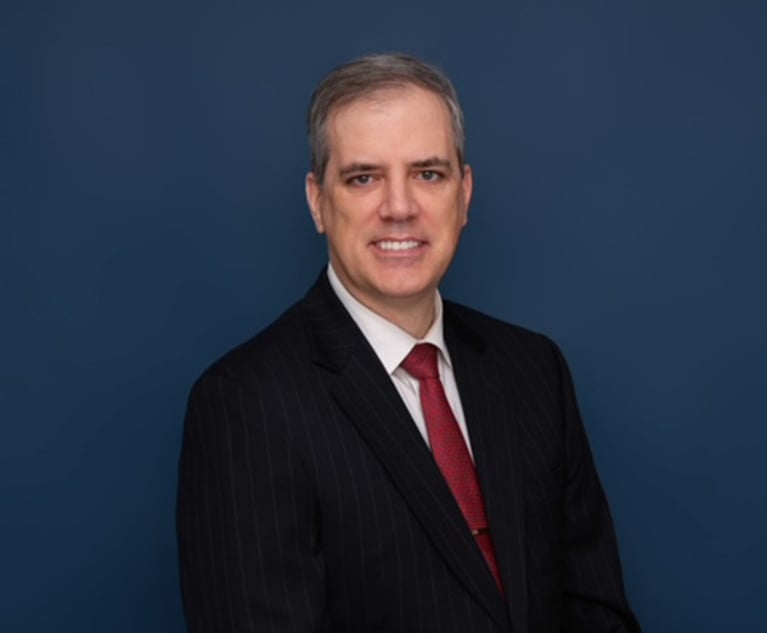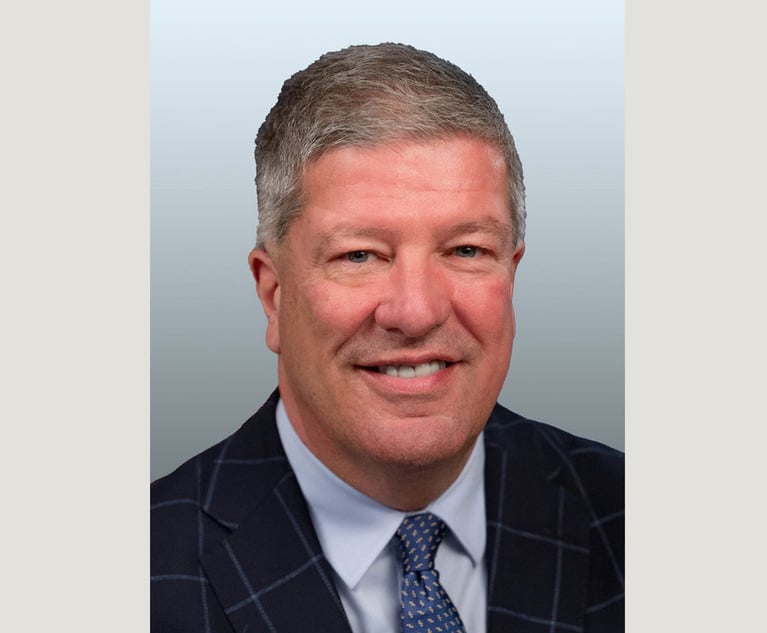Contractor Can't Dodge IBEW 98's Lawsuit Over Underpaid Workers
U.S. District Judge Mark Kearney of the Eastern District of Pennsylvania denied defendant Farfield's request for summary judgment, ruling that issues of fact remained as to whether the company failed to pay workers the prevailing rate for journeyman electrical work.
August 28, 2019 at 02:28 PM
3 minute read
 Photo: Sawat Banyenngam/Shutterstock.com
Photo: Sawat Banyenngam/Shutterstock.com
A federal judge has declined to toss out a lawsuit filed by the International Brotherhood of Electrical Workers Local 98 against a contractor for allegedly underpaying workers for electrical jobs during a SEPTA project.
U.S. District Judge Mark Kearney of the Eastern District of Pennsylvania denied defendant Farfield's request for summary judgment, ruling that issues of fact remained as to whether the company failed to pay workers the prevailing rate for journeyman electrical work.
According to Kearney's opinion, Local 98 alleged that Farfield had its groundmen perform skilled electrician work but paid them at a lower, unskilled worker rate. The union also claimed the company submitted false claims to the federal government, which funded the project.
The project involved the improvement of a seven-and-a-half-mile stretch of track operated by Southeastern Pennsylvania Transportation Authority from Wayne Junction to Glenside. A key part of the case was determining job classifications.
"The parties cite many worker classifications: groundman, laborer, lineman, journeyman lineman, journeyman indoor wireman, journeyman outdoor lineman, foreman indoor wireman, apprentice indoor wireman, and journeyman electrician. The parties do not clearly explain the differences between the dizzying array of positions," Kearney said. "Notwithstanding the various classifications, Local 98 conceded at oral argument we may divide workers into two buckets: groundmen and laborers in one bucket and linemen, journeymen, foremen, wiremen, and apprentices in the other bucket. It appears the distinction is based on experience in the electrical field."
According to Kearney, questions remained as to what kind of work the groundmen performed, and that precluded summary judgment.
"Construing the evidence in the light most favorable to Local 98 as we must on summary judgment, there is a genuine issue of material fact regarding the type of work groundmen performed and whether they 'assisted' journeymen in identified work precluding summary judgment," Kearney said. "We do not know what 'assist' means; we do not know how one or more of the groundmen performed these services. Did they assist or do the work without supervision? We do not know how Local 98 intends to prove the day-to-day work effort at least on a prima facie basis. We do not today decide the relative burdens of proof at trial. But we cannot decide in favor of Farfield based on this genuinely disputed record. The material facts concerning the groundmen's activities are challenged by testimony suggesting performing work possibly beyond assisting the journeyman."
Farfield also claimed that the statute of limitations had run on the union's claims. Farfield argued that because the government declined to intervene when the initial complaint was filed in 2003, time had run out.
Local 98 countered that, under the U.S. Supreme Court's 2019 ruling in Cochise Consultancy v. United States ex rel. Hunt, a relator is not "the official of the United States" triggering a three-year statute of limitations period.
"Local 98 filed its complaint on September 17, 2009, seven years after Farfield's first violation in September 2002 and is timely under the limitations period," Kearney said.
Susan R. Friedman of Stevens & Lee represents Farfield and did not respond to a request for comment.
James E. Goodley of Jennings Sigmond represents IBEW and did not respond to a request for comment.
This content has been archived. It is available through our partners, LexisNexis® and Bloomberg Law.
To view this content, please continue to their sites.
Not a Lexis Subscriber?
Subscribe Now
Not a Bloomberg Law Subscriber?
Subscribe Now
NOT FOR REPRINT
© 2025 ALM Global, LLC, All Rights Reserved. Request academic re-use from www.copyright.com. All other uses, submit a request to [email protected]. For more information visit Asset & Logo Licensing.
You Might Like
View All


Stevens & Lee Hires Ex-Middle District of Pennsylvania U.S. Attorney as White-Collar Co-Chair
3 minute read
Judge Tanks Prevailing Pittsburgh Attorneys' $2.45M Fee Request to $250K
5 minute readTrending Stories
- 1De-Mystifying the Ethics of the Attorney Transition Process, Part 2
- 2Being a Profession is Not Malarkey
- 3Bring NJ's 'Pretrial Opportunity Program' into the Open
- 4High-Speed Crash With Police Vehicle Nets $1.6 Million Settlement
- 5Embracing a ‘Stronger Together’ Mentality: Collaboration Best Practices for Attorneys
Who Got The Work
J. Brugh Lower of Gibbons has entered an appearance for industrial equipment supplier Devco Corporation in a pending trademark infringement lawsuit. The suit, accusing the defendant of selling knock-off Graco products, was filed Dec. 18 in New Jersey District Court by Rivkin Radler on behalf of Graco Inc. and Graco Minnesota. The case, assigned to U.S. District Judge Zahid N. Quraishi, is 3:24-cv-11294, Graco Inc. et al v. Devco Corporation.
Who Got The Work
Rebecca Maller-Stein and Kent A. Yalowitz of Arnold & Porter Kaye Scholer have entered their appearances for Hanaco Venture Capital and its executives, Lior Prosor and David Frankel, in a pending securities lawsuit. The action, filed on Dec. 24 in New York Southern District Court by Zell, Aron & Co. on behalf of Goldeneye Advisors, accuses the defendants of negligently and fraudulently managing the plaintiff's $1 million investment. The case, assigned to U.S. District Judge Vernon S. Broderick, is 1:24-cv-09918, Goldeneye Advisors, LLC v. Hanaco Venture Capital, Ltd. et al.
Who Got The Work
Attorneys from A&O Shearman has stepped in as defense counsel for Toronto-Dominion Bank and other defendants in a pending securities class action. The suit, filed Dec. 11 in New York Southern District Court by Bleichmar Fonti & Auld, accuses the defendants of concealing the bank's 'pervasive' deficiencies in regards to its compliance with the Bank Secrecy Act and the quality of its anti-money laundering controls. The case, assigned to U.S. District Judge Arun Subramanian, is 1:24-cv-09445, Gonzalez v. The Toronto-Dominion Bank et al.
Who Got The Work
Crown Castle International, a Pennsylvania company providing shared communications infrastructure, has turned to Luke D. Wolf of Gordon Rees Scully Mansukhani to fend off a pending breach-of-contract lawsuit. The court action, filed Nov. 25 in Michigan Eastern District Court by Hooper Hathaway PC on behalf of The Town Residences LLC, accuses Crown Castle of failing to transfer approximately $30,000 in utility payments from T-Mobile in breach of a roof-top lease and assignment agreement. The case, assigned to U.S. District Judge Susan K. Declercq, is 2:24-cv-13131, The Town Residences LLC v. T-Mobile US, Inc. et al.
Who Got The Work
Wilfred P. Coronato and Daniel M. Schwartz of McCarter & English have stepped in as defense counsel to Electrolux Home Products Inc. in a pending product liability lawsuit. The court action, filed Nov. 26 in New York Eastern District Court by Poulos Lopiccolo PC and Nagel Rice LLP on behalf of David Stern, alleges that the defendant's refrigerators’ drawers and shelving repeatedly break and fall apart within months after purchase. The case, assigned to U.S. District Judge Joan M. Azrack, is 2:24-cv-08204, Stern v. Electrolux Home Products, Inc.
Featured Firms
Law Offices of Gary Martin Hays & Associates, P.C.
(470) 294-1674
Law Offices of Mark E. Salomone
(857) 444-6468
Smith & Hassler
(713) 739-1250





